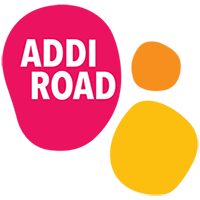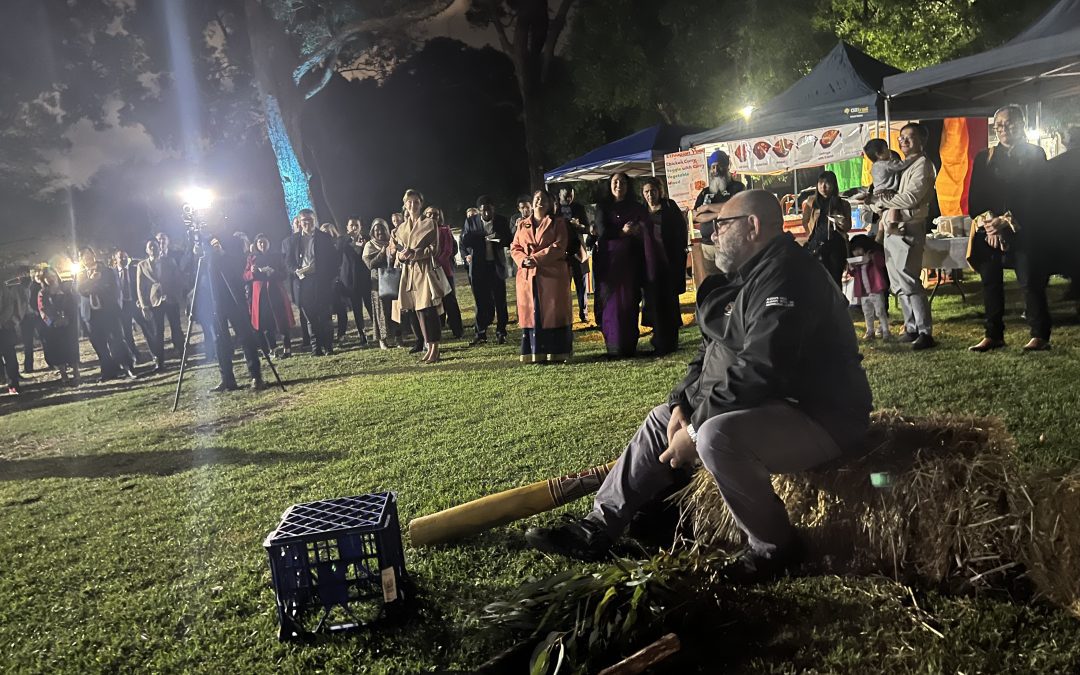Warmth and light. Brendan Kirin, a cultural representative from the Metropolitan Local Aboriginal Land Council, stands before a low-burning fire, ready to place leaves on the red coals and begin a smoking ceremony to launch a very special evening for the Addison Road Community Organisation in Sydney’s Marrickville.
The Federal Minister for Immigration, Citizenship and Multicultural Affairs, Andrew Giles MP, is here to launch the Multicultural Framework Review. Some 300 dignitaries, politicians, community leaders and media figures have come to hear him speak inside Addi Road’s Gumbramorra Hall.
Giles’ announcement marks the 50th anniversary of the very first Australian Multiculturalism policy paper in 1973, when then Immigration Minister, Al Grassby, published the Whitlam government’s ‘A Multi-Cultural Society for the Future’.
As Giles will note, “While, of course, multicultural Australians had called this country home before the 70s, the Whitlam government was the first to elevate the ideal of a multicultural Australia to the national stage – and to begin to recognise the great benefits of a diverse society.
It’s a surprise to hear “there hasn’t been a review of how Government supports multiculturalism since 1973”. Not to mention being reminded of the history leading up to that pivotal moment: “As we celebrate the 50th anniversary of this milestone, we can’t overlook the discriminatory – and frankly racist – policies of governments immediately prior to this,” says Giles. “The fact that the remnants of the White Australia still stood 51 years ago should give us all pause. It is a reminder of how recently national governments sought to enforce assimilation rather than inclusion – telling people, in effect, how to be Australian, instead of asking: what can it mean to be Australian?”
The Multicultural Framework Review will examine policy settings and programs around everything from immigration to employment, as well as the applied reality of concepts like ‘diversity’ and ‘inclusiveness’, drawing on the experience of government departments, civil society groups and everyday Australians. A final report will be returned to Giles in 2024, amounting to what he describes as “a roadmap for our multicultural future”.
It’s hard to underestimate the significance of such a Review, effectively shaping our society for the rest of this century. Reflecting on the period since Al Grassby’s policy paper, Giles points out how much Australia has changed: “Over half of us were either born overseas or have parents born overseas.” Combine this with the Census information that over 5.5 million Australians speak a language other than English at home and you have a massive recalibration of who and what we are.
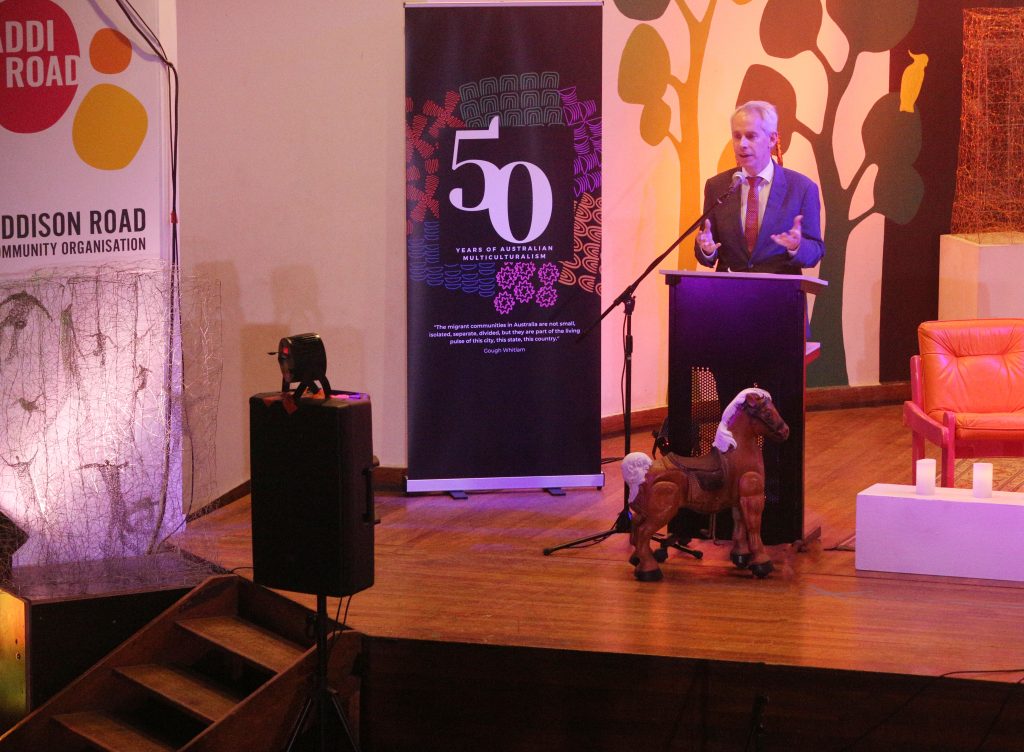
Andrew Giles MP launches the Multicultural Framework Review at Addi Road. Photo Stuart Spence.
A former immigration lawyer, Andrew Giles has sat going over his speech inside the office of Addi Road CEO Rosanna Barbero. He’s greeted there by Barbero and ABC News journalist Jessica Rendall, who has flown down from Darwin to host this evening.
Among the guests in the Hall are Khedra Grassby, Al Grassby’s grandson, as well as figures like Craig Foster, an Addi Road Ambassador and Chair of the Australian Republic Movement; actor and Addi Road volunteer Bryan Brown and actor-director Rachel Ward; the ABC’s Annabel Crabb; TAFE NSW Multicultural Officer Paula Abood; Dr Julianna Jamaluddin from Bankstown Hospital; and Jihad Dibb, the first Muslim Minister in the NSW Parliament, with multiple portfolios across youth justice, emergency service and digital government.
It’s a guest list signal the significance, diversity and depth of the occasion. Osmond Chiu, a Senior Policy and Research Officer for the Community and Public Sector Union, will tweet about the evening and the Multicultural Framework Review as an opportunity “to hear from all communities about an Australian identity, built on historical truth and justice, for us all”.
Like Chiu, Barbero believes that “the Review represents a genuine commitment to hear from the grassroots, from the people, encouraging participation in a long overdue multicultural framework for the nation. They could have launched it anywhere. But when you have something to say that matters you go to a place where there is real representation, in the present day and also historically.”
During the Whitlam era community centres flourished as hubs for arts and culture, reconciliation and multiculturalism. It was back in 1975 that an old, nine-acre army depot – with buildings and barracks dating back to World Wars One and Two – was finally handed over to the multicultural community of Marrickville after much lobbying.
Residents, social workers, ethnic community groups, artists, and environmentalists of the era had different needs and agendas for what was possible. The Addison Road Community Centre Organisation was formed to fight for and articulate their larger purpose, along with each group’s more particular needs and interests… A Greek community theatre; a childminding centre initiated by Addi Road for working mothers sweating in the then local rag trade; self-defence classes kicked off by a group of men from Turkish Welfare keen to help youth-off-the-streets find discipline and focus; every tumbledown building drawn into the mushrooming ideals of the time and the different groups living in Sydney’s Inner West.
It’s because of this history that the Addison Road Community Centre is now recognised as a birthplace of multiculturalism, a pioneering model for diversity led by grassroots ethnic groups. Throughout Gumbramorra Hall there are postcards marked ‘50’ that carry a rousing quote from Gough Whitlam: “The migrant communities in Australia are not small, isolated, separate, divided, but they are part of the living pulse of this city, this state, this country.”
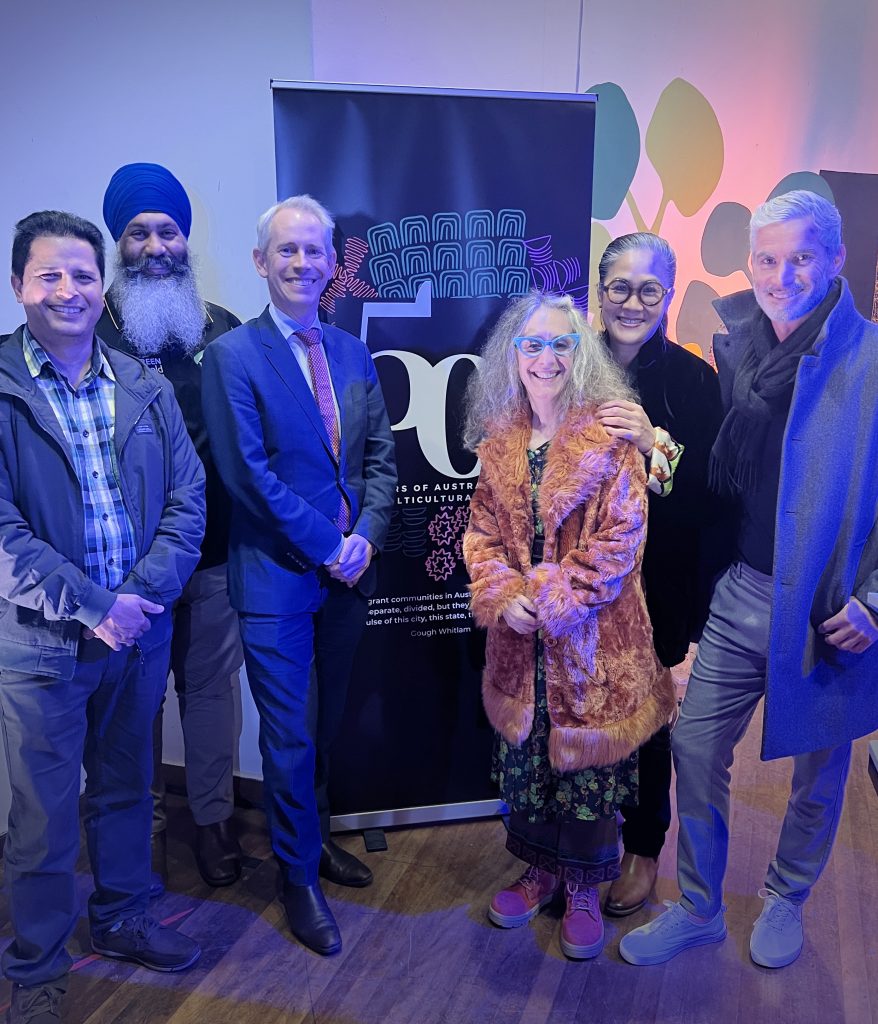
L-R: Tarun Singh and Amar Singh of Turbans 4 Australia; Minister Andrew Giles; Addi Road CEO Rosanna Barbero; chef Kylie Kwong; Addi Road Ambassador and Chair of the Australian Republic Movement, Craig Foster. Photo Stuart Spence.
Inside the hall chef Kylie Kwong is photographing the food relief hampers that are stacked on pallets and pushed to one side of the hall. There’s a slideshow projection shining above them, Stuart Spence’s images depicting the multicultural life and social justice programs of Addi Road day-to-day.
Andrew Giles acknowledges Rosanna Barbero as “an extraordinary person” who makes “the magic happen here”, pointing out the pallets and Gumbramorra Hall’s more usual day-time role as a food relief hub for the city. Addi Road’s work, he says, is an example of “what is good about Australian multiculturalism. In supporting people in need it shows our best side to the world. An opportunity and an obligation to step up.”
The path forward, of course, has never been straight or simple, even if it may be clear to some. In his launching speech for the Multicultural Framework Review, Giles acknowledges the impact of the Covid-19 pandemic in fuelling anti-Asian racism, as well coarse politicking over refugees and immigration lowering the national conversation: “The now Opposition leader – wrongly, offensively and cruelly – claiming that Victorians were “scared to go out” because of so-called African gangs. A damaging decade of wasted opportunities for multicultural Australia.”
Brendan Kirin has meanwhile conducted an affecting and entertaining smoking ceremony before delivering a powerful and, at times, scorching Welcome to Country inside Gumbramorra Hall. The Marrawarra and Barkindji man marks out an indivisible reality between First Nations and post-colonial, migrant history that will surge through the evening.
Kirin speaks affably at first about the significance of smoking ceremonies in Aboriginal life, “from the beginning to the end of life. Babies are put through the smoke to get the smell of country on their bodies. The different plants we burn have different healing properties. We have smoking ceremonies when people die, what we call ‘sorry business’. When I go out to get the leaves for any ceremony, I sing to the trees. My song, my prayer, goes into the tree, it goes into the leaves. When I burn them, that song is released and you get that smell of country on your body.”
He then gives “thanks to WHS (Work, Health and Safety)” rules, joking, “I always use a sacred Bunnings tin when I do a smoking ceremony”. Kirin ushers the crowd in and they file through the smoke.
A little later inside Gumbramorra Hall he returns, “me again”, to do the Welcome to Country. It’s then that Kirin accelerates his message, quietly scourging the “generic and rote Acknowledgements of Country” that he too often hears as “a bit disrespectful”. Kirin goes on to say, “My history is everyone’s history. My backyard is your backyard. I can tell you history of just about every race in this country, but how many of you can tell the same about my people?”
On a more personal level, he talks of his mother’s life and his own as experience of the Stolen Generations. Born in 1971 in Crown Street Women’s Hospital in Surry Hills, he refers to it as “the last place I felt my mother’s touch”. Kirin would search for his mother all his life. “I found her grave seven years ago.” So it is he can never accept it when people say “we never did it” and “it’s nothing to do with us”, when they say “get over it”.
He turns the feelings of sharpness over. Thanks everyone for listening. “For having me here to do this Welcome to Country. It’s an honour to perform it. Ten years ago we would not have had a Welcome or an Acknowledgement like this. It’s no different to welcoming visitors or guests in your house…. without it, we believe, country becomes dead.”
Kirin is no easy act to follow as a speaker; nor is his story and the sentiments he puts before everyone tonight. But in his prepared speech Andrew Giles anticipates some of what Kirin has laid bare and direct to the audience. Giles begins by citing how “27 years ago, in his first speech to the House of Representatives, the Member for Grayndler, and now Prime Minister of Australia, highlighted the intrinsic link between strong multiculturalism and reconciliation with Indigenous Australians.”
For Giles the new Multicultural Framework Review is deeply connected to The Voice. “This year, we are presented with a momentous opportunity to, finally, tell Australia’s story truthfully,” he says. “I am proud to be part of a government that is committed to implementing the Uluru Statement from the Heart in full. In looking forward to how we can strengthen our diversity, let us all recognise the unique privilege we have to share this continent with the world’s oldest continuous culture. An opportunity to recognise in our nation’s birth certificate that the history of this island did not begin in 1788.”
The words ‘nation’s birth certificate’ take on particular power after Kirin’s incendiary Welcome. Giles seeks out the possibility that springs from it. “At a meeting earlier today of Multicultural Affairs Ministers from across the country, Ministers joined the Federal Government in re-committing support for the Voice from every state and territory government. In this spirit, I implore you to reach out to your communities, and ensure that they too take up the opportunity to vote ‘Yes’ later this year.”
To guide the Multicultural Framework Review over the next twelve months, Giles has appointed a three-person panel to be chaired by Dr Bulent Hass Dellal AO. He is joined by Nyadol Nyuon OAM, a human rights advocate and the Director of the Sir Zelman Cowan Institute, and Christine Castley, CEO of Multicultural Australia. They take the stage for a conversation with the ABC’s Jessica Rendall about the Review and the notion of multiculturalism itself.
Dellal is adamant in explaining that the initiating vision for a multicultural Australia fifty years ago: “In Australia, multiculturalism was never socially engineered. The community said we are a multicultural society. And the Government responded.” Like Minister Andrew Giles, Dr Dellal nonetheless acknowledges “something has been missing” in the evolution of a multicultural vision in the half century since the concept first took shape. “The voice of First Australians.”
Addi Road started the conversation with multicultural communities on the Uluru Statement from the Heart and subsequently the Voice back in February 2021. Christine Castley picks up this thread and Kirin’s earlier reflections on the need for a real meaning behind the ritual Acknowledgement of Country, referring to a new wording for multicultural gatherings that recognise “the shared pain of the past… the shared hopes of the future.”
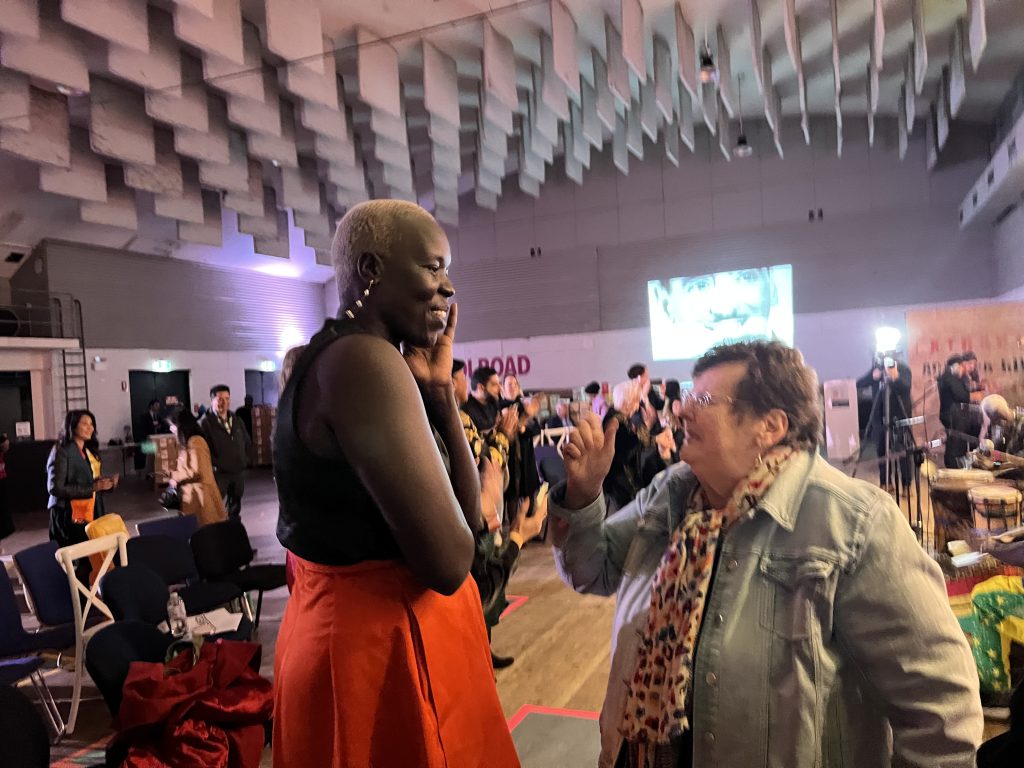
Nyadol Nyuon meets Ricci Bartels, who was appointed a Multicultural Ambassador of Australia by the Gillard Government in 2012. Photo Mark Mordue.
Nyadol Nyuon examines things from a more radically youthful perspective. “Multiculturalism,” she says, “can sometimes be a narrative from the outside. Those who come from the community know it is much more complex, especially children who are interested in representing Australia as their first choice. Young people who are not grateful for multiculturalism, who don’t see themselves as outside anything.”
Nyuon cites the example of the North Melbourne and Flemington public housing towers that were placed into hard lockdown without any notice during the pandemic. A sudden police presence; people left without access to food and medication. The fear and confusion. Yet within 24 hours young people living in the Towers had done what the government had been trying to do for months, translating information about the pandemic and letting people know what was going on. “The government had been neglecting the talent of the community,”
“We have to move beyond the deficit method of approaching people and communities,” Nyuon says emphatically. “And challenge this assumption multiculturalism is being done for them.”
Her words hark back to the night’s beginnings. Jessica Rendall’s opening address: “Place. People. Promise. It’s the multicultural story of Addi Road for half a century.” A choir from Burwood Girls High School singing U2’s ‘I Still Haven’t Found What I’m Looking For’ to welcome the arriving audience, their song capturing the spirited mood of the evening and an awareness of an incomplete mission.
Later, after the speeches are done and the night eases into a purely social gathering, Addi Road CEO Rosanna Barbero and Andrew Giles MP stand for a moment with Amar Singh of Turbans 4 Australia, talking together as Singh’s son and daughter play around the warmth of Kirin’s fire.
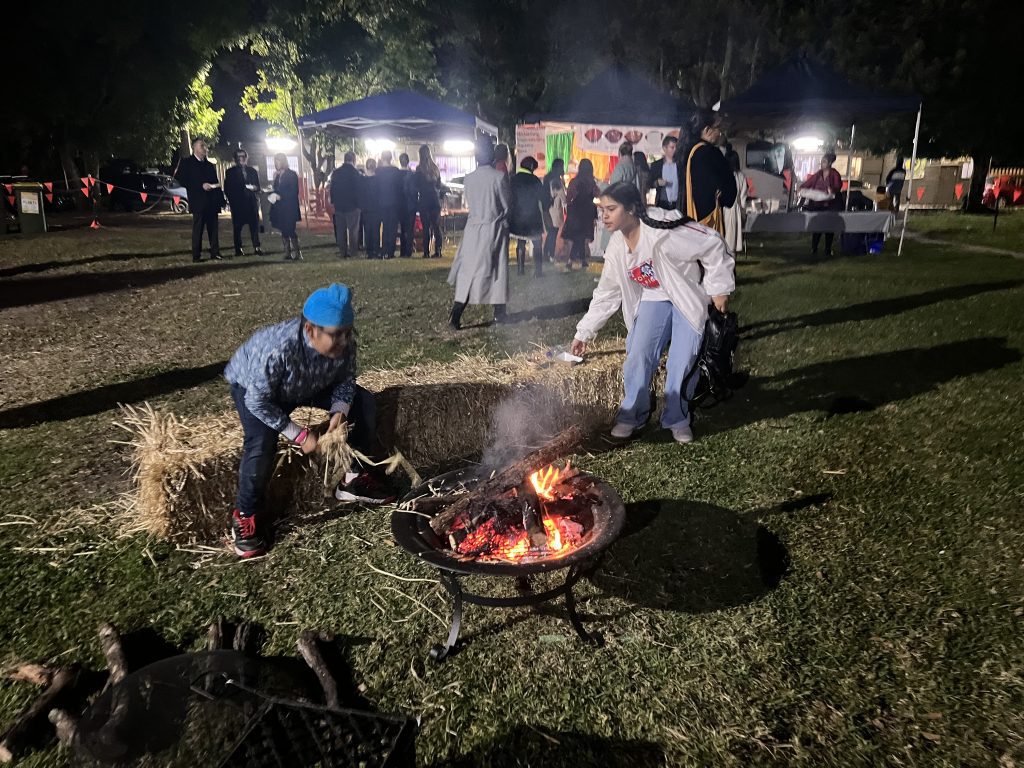
A fire of inspiration is kept alive at the launch of the Multicultural Framework Review at Addi Road in Marrickville. Photo Mark Mordue.
